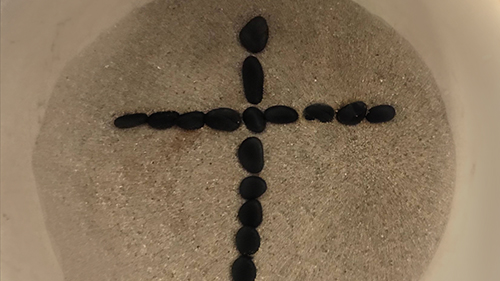Dear Friends,
We have a beautiful scene in today’s gospel of Jesus setting free a woman caught in adultery. From that, it would make sense to do a reflection on forgiveness. However, I was asked a question the other day and I thought I would try to blubber forth some answer. The question was, “Is it a sin to hate Putin? Wouldn’t God hate Putin for all the sorrow and destruction he is causing to the people of Ukraine and his own people?”
The Old and New Testaments contain passages in which we are admonished to hate something, like evil, but not to hate our brother and sister. We are all familiar with the adage: “Hate the sin but love the sinner” (which I do not think is in the bible, but it is commonly known). That saying can easily leave the impression that the sin is floating out there totally independent of the person, who, in the meantime, remains pure as the driven snow. But in reality, no sin disconnected from a sinner can be found. Hatred is the emotional response to our recognition that some specific thing is wrong in the world.
To make this easier, let’s talk about two kinds of hatred: hatred of abstractions and hatred of human beings. The hatred of abstractions (like the hatred of “child abusers everywhere”, the hatred of Hitler, the hatred of Putin) is a formal position, an emotional-reaction, a monument erected at the request of voters. The hatred of abstractions plays a real but small role in the human life.
The hatred of particular human beings, on the other hand, is a living and active emotional state directed toward known persons like mothers or fathers, neighbors, co-workers, teachers, students, and so forth. The hatred of Hitler, Stalin, and child abusers everywhere has precious little in common with hatred for an arrogant co-worker, or hatred for a sister-in-law who insults you, or hatred for a spouse who has left you. The hatred of actual human beings is a spiritual disease, it is a sin. It may have begun as a justified anger, but when it moves to hatred it becomes sinful.
It is a rare occasion when individual hatred spills over into violence. Most of the time, it lives primarily in our hearts. There we fantasize about the clever and cutting things we would like to say to those we hate. There we dream of the deep shame those we hate would feel when they hear our entirely fair and unbiased assessment of their wickedness. In some back corner of those fantasies, we tell ourselves that what we really want is for the people we hate to repent, but this is not true, for we rarely pray for them to repent. Hate is not simply the acknowledgement that another person is cruel, nor the realization that another person has escaped justice. Rather, hate is the prolonged, indulged enjoyment of the thought of another being insulted and degraded.
The appeal of hate is obvious. Hate is sleek and simple. Because hate makes objects of human beings, it skims off all the difficult, trying, and contradictory issues. Hate acts quickly. Like all sin, hate is boring and it makes those who practice it look foolish and petty to others. Hate moves us away from God.
So, can I hate Putin and what is happening in the Ukraine and Russia? Sure, until it reaches the point where I spend my dreams fantasizing about his demise. And, what is the cure for the hatred I which treasure in my heart for the individuals who have hurt me over the years? The same solution Jesus offered…let the one without sin cast the first stone. Only the painful recollection of one’s own sins can calm the destructive passion for other people’s sins. Those who came to throw stones ended up walking away. They realized, they too were guilty of sin. Perhaps even greater sin.
When in honesty we come to understand how much we have been forgiven, we are free to release others from our hatred and invite them to enjoy divine love.
Peace,
Fr. Damian



